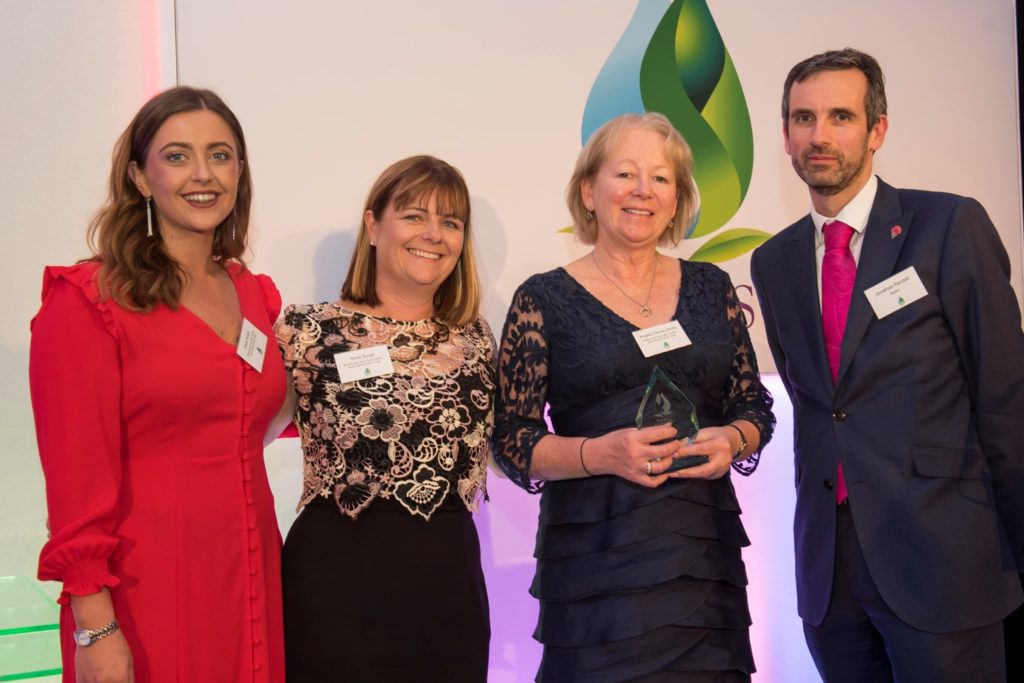
(From left to right: Olivia Powell, Tania Burge and Angela Davies-Smith from the TOPS team, together with programme sponsor Jonathan Randell, Director, Market Access, Biogen)
The QuDoS recognition programme, organised by pharmaphorum and the Multiple Sclerosis Trust, recognised best practice in care.
North Bristol NHS Trust’s Therapeutic Opportunities Team (TOPS Team) won the Real-World Evidence in Care award. As part of a series of articles profiling the winners, pharmaphorum interviewed the four-strong team – Tania Burge, Angela Davies Smith, Rosie Jones, and Olivia Powell.
Q: What did it mean to win the award?
A: TOPS (Therapeutic Opportunities Team) was developed to enable collaboration between clinical specialist and research clinical specialists to work together to enhance patient care and to embed clinically applicable successful research findings into the service. Winning this award gives recognition to the importance of this approach and is therefore valuable both professionally and for improving patient services. It acknowledges a new way of working in a partnership between clinical and research teams. The development of treatment is often hampered by separation of research and treatment funding routes, and sometimes by lack of direct contact between researchers and the wider clinical services. TOPS has addressed this by involving researchers at the point of service delivery enabling early uptake of evidence-based practice.
Q: How did attending the recognition event benefit your team professionally?
A: Attending the QuDoS recognition event gives insight into how much good quality work is being undertaken in the delivery of services for MS. It provides an excellent opportunity to network with other professionals, learn from each other and to develop future possible collaborations.
Q: Please could you tell me what inspired you to develop the service in the way that it did?
A: As clinicians we are driven to provide evidence-based practice to underpin our work. Through the TOPS team, we have developed opportunities for patients and clinical and research specialists to work alongside each other to enable seamless introduction of a range of interventions based on addressing the clinical need of individual patients and enabling them to benefit from newly developed treatments. Equally it has enabled recruitment into ongoing research programmes giving patients greater opportunity to participate in research. TOPS was therefore developed to allow a seamless patient flow across timely and relevant interventions based on clinical need while also enhancing recruitment into new research projects. The opportunities available for wider and more innovative treatment options are facilitated by discussion during clinical appointments. The resulting intercommunication between clinical and research specialists enables the TOPS Team to work in a formal partnership to the benefit of the service as a whole, and to meet individual patient needs more fully.
At present, the team comprises two senior physiotherapists, one with a research role and one with a treatment management role. A clinical scientist and sports graduate support the research and treatment elements of the service.
Q: Please could you outline how the service works?
A: The service is delivered as part of a regional MS multidisciplinary team and integrates a wide range of treatment opportunities by linking the clinical need of individual patients to the expertise most appropriate to the alleviation of their symptoms. This is done by effectively using normal referral strategies to link routine and newly developing treatment strategies for the benefit of individual patients. By recognising barriers to innovative treatment based on new research evidence we can provide a more linked set of interventions over time. One example of this is inviting patients to participate in the FACETS (a cognitive behavioural fatigue management strategy) training sessions to help overcome fatigue. Reluctance to participate in rehabilitation programmes is often linked to MS related fatigue. The FACETS sessions allow patients to participate in group gym sessions which promote better fitness, improved balance and renewed confidence in what they can do rather than concentrating on what they are unable to do. This requires joint working between clinical and research teams to introduce new evidence-based treatment strategies successfully. It is also the starting point to ensure research projects have an endpoint which impacts on and is appropriate for clinical delivery to patients in a normal, often overstretched clinical setting.
Q: What feedback have you had from patients?
A: Patient feedback has been very positive and appreciative. The projects have focused on symptom self-management, often a neglected area. Furthermore, they have appreciated new developments creating more innovative practice giving them wider treatment options.
Q: How do you plan to develop the service?
We will continue to develop research projects and services in a linked way incorporating a wider breadth of professional skills in the team such as occupational therapy and specialist nursing (particularly in the areas of continence and medication management) which will enable more complex cases to be supported. In addition, promoting more extensive introduction of scientifically trained staff, especially in clinical practitioner roles for direct patient support will be considered. Utilising such roles will support the clinical roles more efficiently as well as adding skills to the team in areas such as data management and analysis.